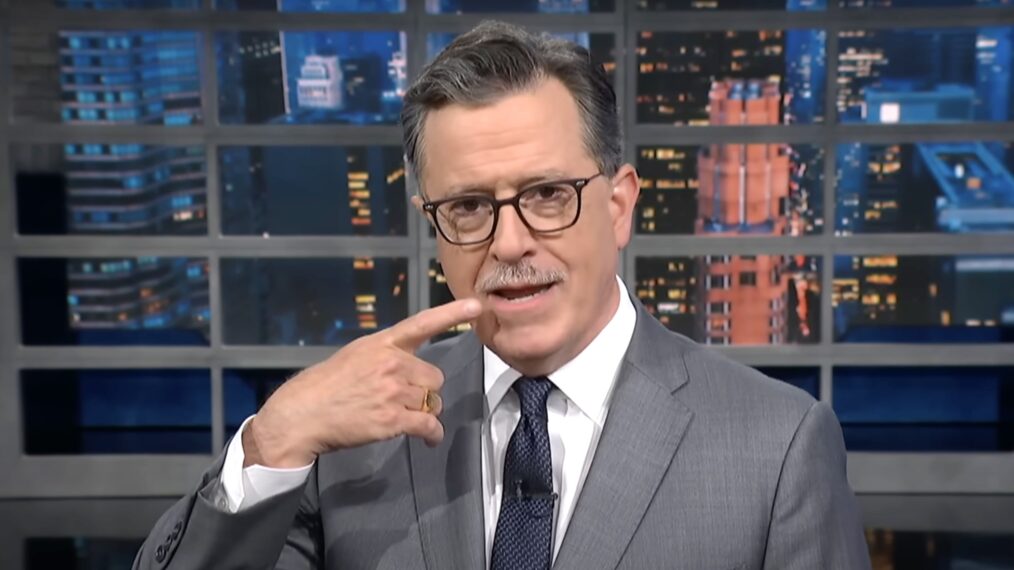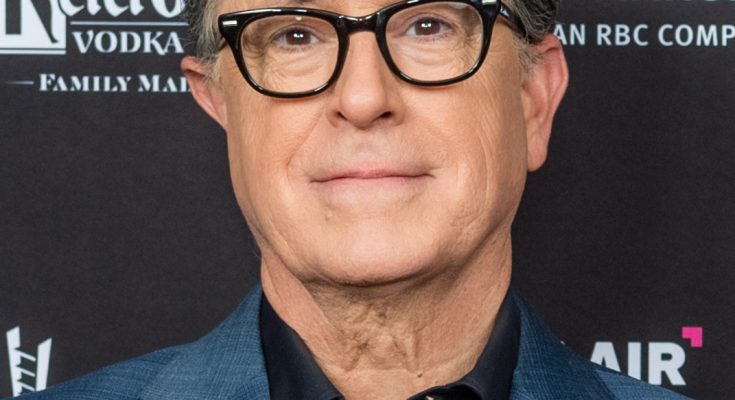In the bloodsport of modern media, it was meant to be a public execution. The stage was set, the victim was wounded, and the executioner was glowing under the studio lights. The phrase intended to be the final nail in the coffin was cruel, polished, and delivered with the smug certainty of a predator moving in for the kill: “That mouth needed a muzzle.”
With those words, Karoline Leavitt wasn’t just commenting on the shocking cancelation of Stephen Colbert’s The Late Show; she was dancing on its grave. The forum, a “Special Town Hall on Media Integrity,” was her coronation, a chance to publicly vanquish a titan of liberal commentary just hours after he had been dethroned by his own network. What she failed to understand was that even without a show, Stephen Colbert still had a microphone, and he was about to give a masterclass in how to use it.

The scene was thick with tension. Colbert, whose career was in ashes following a controversial $16 million settlement between CBS and Donald Trump, looked older, quieter, a man visibly carrying the weight of his professional demise. In stark contrast, Leavitt was radiant, her energy practically vibrating. Social media was already buzzing before the show began: “She’s here to finish him.”
She didn’t wait long. Five minutes into the discussion, she made her move. “Stephen… you’ve made a career off sarcasm and other people’s mistakes,” she began, her tone dripping with faux concern. “Now look what happens when the mirror turns.”
Colbert tilted his head, his face an unreadable mask. Leavitt pressed on, delivering the line she had clearly rehearsed for maximum impact. “That mouth needed a muzzle. America was tired of the noise.”
A few awkward claps punctuated the stunned silence. All eyes turned to Colbert. Would he lash out? Would he crumble? He did neither. He waited. He let her words hang in the air, heavy and ugly. Then, he leaned forward, and the entire dynamic of the room shifted.

“Karoline,” he began softly, his voice a scalpel in the tense quiet, “you know what people remember more than a mouth that talks too much? A mouth that only opens to destroy—never to create.” He paused, letting the philosophical jab land before delivering the body blows. “You think I lost something this week. But you’ve never had it. Not the respect of your staff. Not the loyalty of your party. Not even the truth on your side.”
Gasps rippled through the audience. Leavitt’s smile faltered, replaced by a flash of disbelief. And then Colbert deployed the weapon that no one saw coming: receipts.
And since we’re talking about mouths, Karoline… did yours forget to mention that your own comms director resigned last week in tears? Or that you fired a Black intern for asking why she wasn’t allowed to tweet during Pride Month?”
It was a stunning pivot from opinion to alleged fact. The accusations were so specific, so damaging, that they left no room for a witty retort. Leavitt froze completely, her lips twitching as she searched for words that wouldn’t come. The audience, which had been uncertain moments before, now leaned in, sensing a complete and total reversal of fortune.
What the public didn’t know yet was that Colbert had come prepared for war. Hours later, details would leak about a dossier his team had compiled, nicknamed “The Glass House Folder.” It was filled with screenshots of Leavitt’s team banning reporters who asked about her husband, an internal memo in which she called female MSNBC hosts “emotionally unstable and visually off-brand,” and a damning quote from a fundraiser: “We don’t need them to like me. We just need them to hate someone else.” He never had to show the file. He simply painted the outline of her hypocrisy and let her own silence fill in the rest.
By midnight, the internet was on fire. The hashtag #ColbertMuzzleBackfire exploded, passing 20 million views. Leavitt’s frozen smirk became the star of a thousand merciless memes. But the final confirmation of her collapse came from a hot mic clip, leaked by a CBS staffer. Backstage, her voice shaky and stripped of its earlier bravado, Leavitt was caught asking an aide, “I thought he was done. Why the hell is he still smarter than me?”

It was a raw, unfiltered admission of defeat. The memes flooding social media captured the public sentiment perfectly: “Karoline brought a muzzle. Colbert brought a mirror.”
As the town hall concluded, the moderator gave each guest a chance for a final thought on “media responsibility.” Leavitt, attempting to recover, offered a bland, scripted response, desperate to be forgettable. Then, it was Colbert’s turn. He adjusted his mic, looked directly at her, and then at the camera.
“The thing about mouths, Karoline… some people use theirs to speak truth. Others, to echo power. And some just… rehearse headlines and call it courage.”
He stood up and walked off stage. A boom mic caught his final, chilling words, a perfect epitaph for the evening’s events: “She wanted airtime. Now she’s got silence. And for the first time… it’s honest.”
The fallout was swift and brutal. Within 48 hours, a major super PAC pulled its endorsement of Leavitt’s 2026 campaign, citing “concerns about message discipline.” A scheduled Fox News interview was indefinitely postponed. And a New York Times editorial appeared, warning against “the rise of ambitious mouths disconnected from measurable merit.” It never mentioned her by name. It didn’t have to.
Karoline Leavitt came to humiliate a man at his lowest point, hoping to build her brand on the rubble of his. Instead, she learned a lesson that Stephen Colbert has mastered over a thirty-year career: the loudest voice doesn’t always win. True power lies in controlling the silence. And on that night, Colbert didn’t just walk away with his dignity—he walked away with her spotlight.



